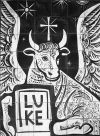
THE GOSPEL OF LUKE
Introduction to John the Baptist: Lk 3,1-6
Historical Anchor: 3,1-2a
The opening words of the two prophets Jeremiah and Hosea show how the Old Testament prophets provided a historial anchor for their books by refering to the kings of their time. Like the prophets of the Old Testament, John is firmly placed by Luke at a given time and place.
Luke takes this further by including rulers from outside Israel. The most powerful person would be Tiberias, the Roman Emperor or Caesar. The fifteenth year of his reign would have been 28-29 AD. All the others named, Pontius Pilate the governor or the various client kings, depended upon the emperor for their power. The two high priests as well could serve only with Roman approval.
Pilate as we know would order the execution of Jesus (23,24) despite believing his innocence (23,4). He did so at the behest of the two high priests (23,1). Lk 23,1-16 describes the trial of Jesus and the interaction between Pilate and Herod.
Herod is Antipas, the son of Herod the Great (1,1). Herod Antipas has a minor role throughout the Gospel and Acts and nothing good is said of him. Acts chapter 12 shows how he persecuted the Christians and then his unpleasant death. The other two rulers mentioned, Philip and Lysanias are not important.
Life under these human rulers meant that the local people of Jesus' time would have been a people living a harsh life under absentee landlords, a life of deprivation, oppression and foreign occupation. We have seen this already for the shepherds outside Bethlehem (2,8). Those conditions form the background to much of the Gospel of Luke. We will see how this Gospel has a special concern with rich and poor, wealth and poverty (Lk 1,53).
Acts 1,21-22 highlights how the ministry and public life of Jesus began with his baptism. The stories concerning the birth and upbringing of Jesus are based on much vaguer traditions and could be shaped by the evangelists for their theological purposes.
John the Baptist: 3,2b-6
"The word of God came to John, son of Zechariah" again places John firmly within the prophetic tradition of the Old Testament as we can see in the Jeremiah (1,4) and Hosea (1,1) quotations and as we were told in 1,76. The desert is the place where Israel was formed as the people of God after the exodus from Egypt and is seen as the place of renewal - the first two chapters of Hosea being a good example.
The Isaiah quotation will be different in your Bible because our translations use the Hebrew version. Luke though is quoting from the Greek Bible which is often different to the Hebrew. Luke (like Mark and Matthew) also changes the punctuation in verse 4. Isaiah has: "A voice cries: In the desert...." which is changed to "A voice cries in the desert..." In Isaiah, the voice is in heaven, in the Gospels the voice is John.
Luke makes the quotation a line longer than Mark because the salvation of God is an important theme for him as we have seen in the first two chapters. Like Isaiah 40,5 and Is 49,6 as well as Ps 67,2 ("your saving power among all nations"), Luke makes the point that this is a universal salvation.
Return now to the main page.
